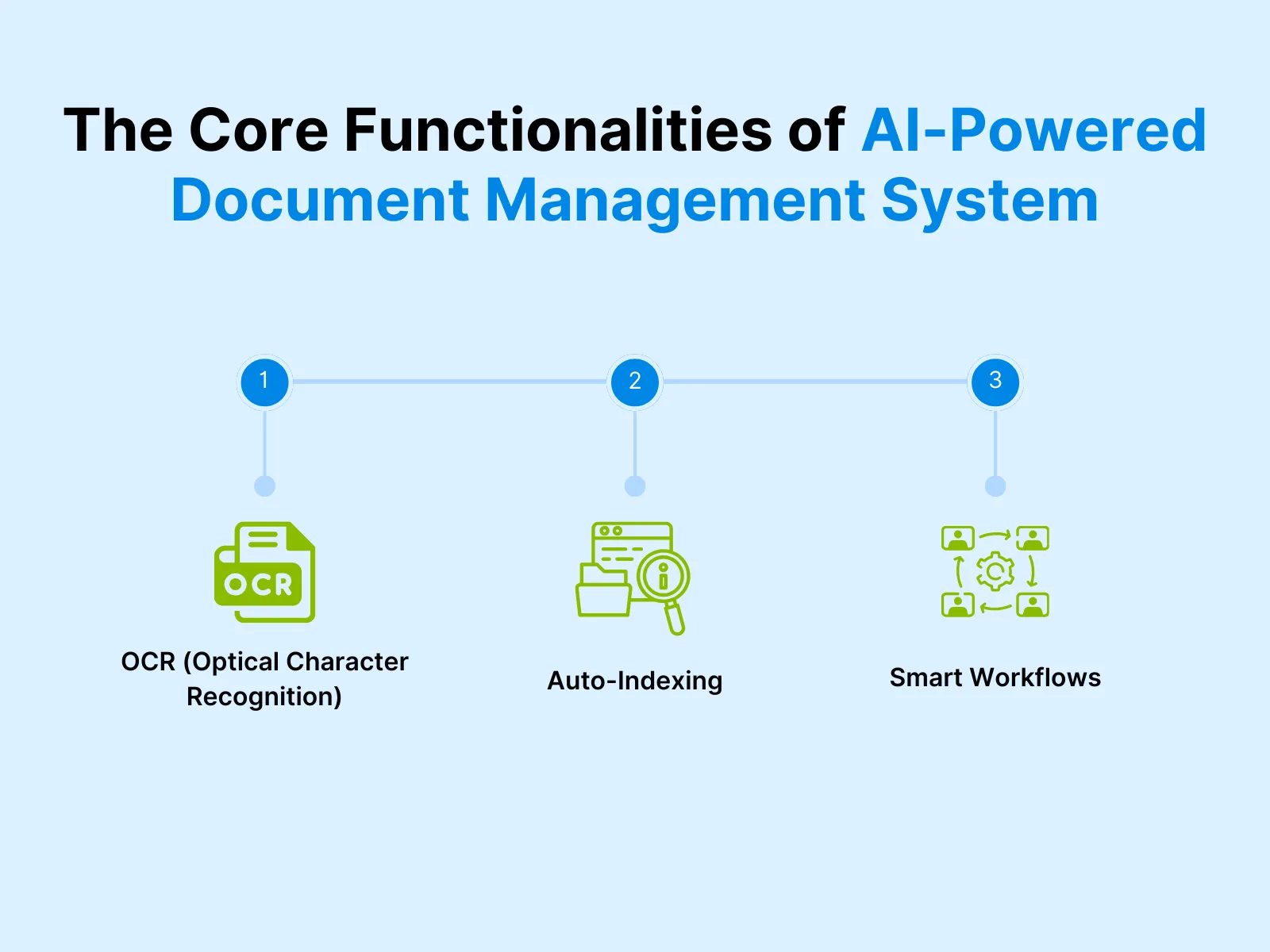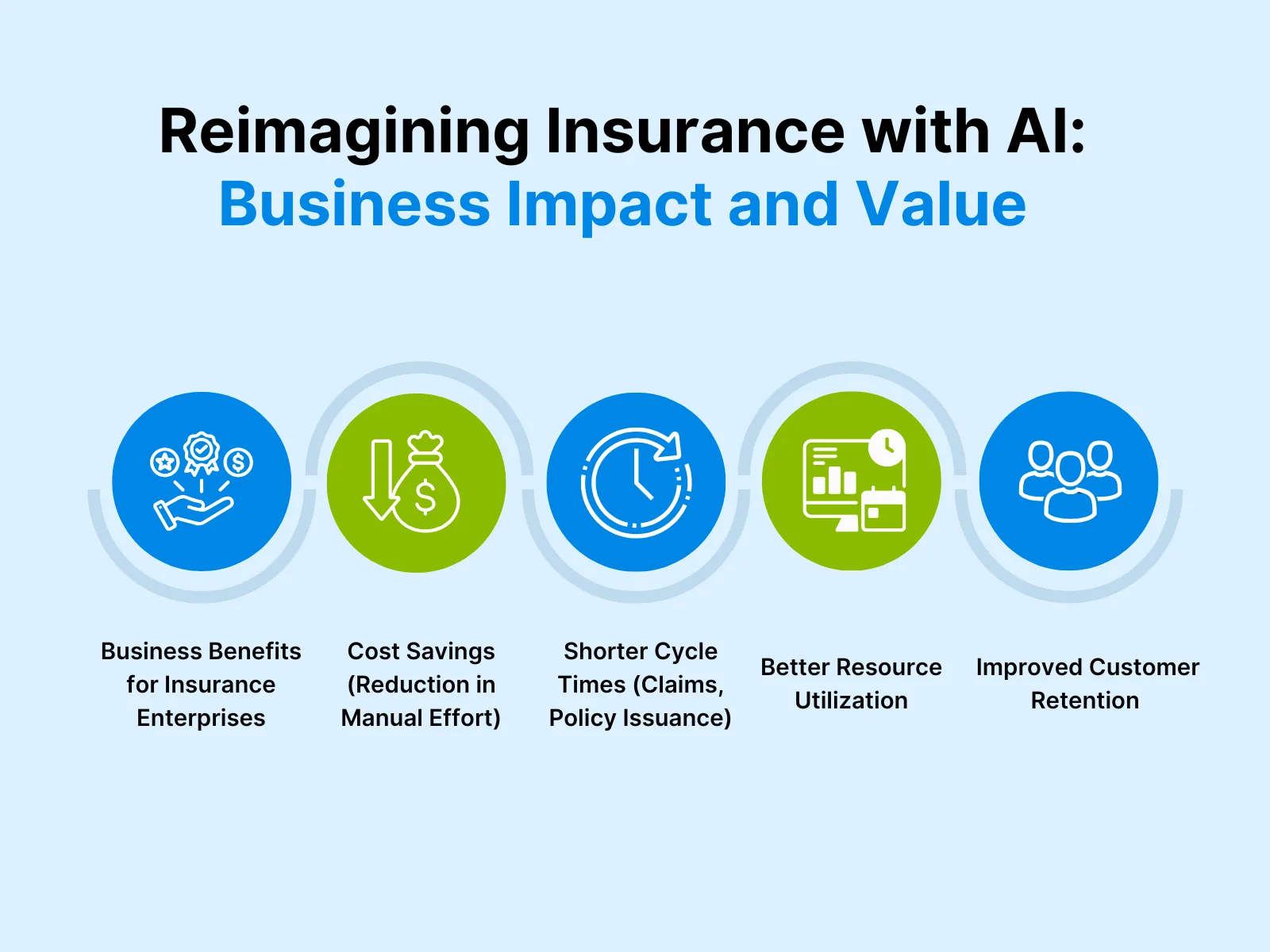Automating Document Management and Modernizing Insurance Operations With AI
This blog explores how AI is revolutionizing travel by enhancing personalization, automating customer service, and optimizing experiences. From predictive analytics to voice assistants, data-driven AI innovations are reshaping how travelers plan, book, and interact with travel services.

Data and documents are the lifeblood of every insurance company—powering everything from underwriting to streamlining claims. However, with insurers managing over 100,000 documents annually, as per a report, manual handling of processes introduces significant risks. Human errors, misinterpretations, and inefficient document workflows can lead to costly setbacks, regulatory penalties, and missed sales opportunities.
Furthermore, an insurance journal states that errors made by claims professionals were the primary drivers of enforcement actions against U.S. property and casualty insurers. Now, this is a perfect example depicting the growing intricacies and evolving complexities of manually handling rising volumes of paperwork, taking an enormous toll on the insurance industry’s overall productivity.
Apart from this, the insurance sector continues to deal with high operational costs largely driven by manual processes. From data entry to claims handling, relying solely on human resources increases inefficiencies, delays, and the risk of costly errors. These outdated workflows not only slow down service delivery but also hinder scalability and competitiveness in an increasingly digital and customer-centric market.
Insurance companies are increasingly turning to AI—a transformative force to streamline the complex and document-heavy process. This is because AI-powered document management has become a game-changing asset that automates data extraction, classifies, and validates them with accuracy.
It significantly reduces manual workload, eliminates costly errors, and speeds up processing times. Beyond efficiency, it enhances compliance, improves data accuracy, and supports better decision-making. For insurance leaders, this shift represents a strategic move toward smarter operations and sustained competitiveness in an increasingly digital-first industry.
Managing Documents Intelligently With AI

Before we go on to discuss how you can manage all documents effectively and smartly using artificial intelligence, let’s first define what modern document management software development is. An advanced DMS is an intelligent and centralized platform that allows insurance companies to securely store, organize, and manage digital documents across their enterprise database.
Built to achieve document automation, enhanced scalability, and robust compliance, these solutions optimize workflows, ensure version control, and support seamless collaboration across departments. They also integrate with core tools and technologies, enabling C-level executives to make key informed decisions and drive operational efficiency. They simplify data governance and help implement digital transformation across the organization.
The Core Functionalities of AI-Powered Document Management System
The next important question that comes to mind is how you would distinguish between an AI-enabled DMS solution and conventional software to handle documents. The answer is through its innovative features, functionalities, and digital capabilities that label it as powered by AI. So, what are these modern capabilities? Let’s check them out.
1. OCR (Optical Character Recognition)
AI-driven OCR software converts scanned documents and images into machine-readable text with high accuracy. It accelerates data extraction, reduces manual input, and simplifies the searching and accessibility of critical information in real time.
2. Auto-Indexing
AI-driven OCR software converts scanned documents and images into machine-readable text with high accuracy. It accelerates data extraction, reduces manual input, and simplifies the searching and accessibility of critical information in real time.
3. Smart Workflows
Intelligent workflows use AI to automate routine insurance processes, such as approvals, routing, and compliance checks. They adapt to real-time inputs, reducing bottlenecks, minimizing human error, and significantly accelerating end-to-end document processing.
Key Capabilities and Use in Insurance
Intelligent document management is fueled by AI/ML development services to enhance capabilities like automated data extraction, smart indexing, and real-time compliance tracking. The various smart features, such as auto-classification and AI-driven workflows, reduce errors and streamline document-intensive processes.
In regulated industries like insurance, these systems enable faster claims processing, improved underwriting accuracy, and audit-ready documentation. It ensures secure access and regulatory alignment to boost operational efficiency and deliver a smooth, compliant customer experience.
Integrate OCR Auto-Indexing and Smart Workflows to Empower DMS Solutions
Boost productivity and drive faster decisions with DMS powered by AI
Handling the Insurance Documents Manually and Paying the Price
If you are still managing the insurance documents manually, there are greater chances of tacking with a multitude of inefficiencies, data misinterpretation, and compliance risks that aren’t always visible on the surface. These are mainly hidden costs that significantly impact performance and downgrade customer satisfaction.
1. Time Delays in Claims and Underwriting
Manual handling of documents in claims and underwriting results in significant processing delays. Paper-based or email-driven workflows necessitate constant communication between teams, leading to bottlenecks. These delays not only hinder decision-making but also elevate the risk of missed service-level agreements, impacting both revenue and reputation.
2. Human Error and Data Loss
When staff manually input or transfer information, the potential for errors increases dramatically. Misfiled documents, incorrect data entries, and lost paperwork can lead to flawed decisions or even denied claims. These mistakes cost insurers time and money while also damaging trust with customers and regulators.
3. Compliance Risk
In heavily regulated industries like insurance, improper handling or storage of sensitive documents can trigger compliance violations. Manual processes make it harder to track access, enforce retention policies, or produce complete audit trails—exposing companies to fines, legal issues, and reputational harm.
4. Staff Overhead Due to Repetitive Tasks
Employees spend countless hours on low-value, repetitive tasks such as data entry, document sorting, and status tracking. These tasks drain productivity and inflate operational costs. Skilled professionals end up underutilized, focusing on administrative work instead of strategic or customer-focused initiatives.
The Vital Use Cases: How AI is Minimizing DMS Operational Overheads
AI-based DMS reduces operational overhead by automating tasks, optimizing data extraction, and improving overall efficiency. These systems help in document automation and minimizing human errors, and streamlining resource allocation, ultimately leading to cost savings and increased productivity. Let’s discuss a few important use cases below.
1. Underwriting
Automated Data Extraction From Application Documents
Speed and accuracy are the two most essential components of the underwriting process. Manual document handling often delays tasks due to inconsistencies. AI transforms and automates data capturing from application documents. It uses tech stacks like natural language processing and optimal character recognition to efficiently scan, read, and extract vital information from submitted forms and supporting documents—eliminating the need for manual entry and reducing the risk of human error.
Fraud Risk Detection
AI also plays an imperative role in fraud risk detection. It analyzes the submitted documents thoroughly against all internal databases and historical claim patterns, allowing the systems to flag anomalies that signal potential fraud. This proactive approach not only saves time but also protects insurers from significant financial losses.
Faster Policy Insurance
AI in insurance reduces the overall timeframe for underwriting through quicker policy issuance. Features like workflow automation assist underwriters in receiving pre-verified, indexed, and categorized files, enabling quicker review and decision-making. They don’t have to juggle through time-consuming PDF files and emails and focus on enhancing customer service and risk evaluation. As a result, insurers can issue policies faster, improving responsiveness and enhancing competitiveness in a customer-driven market.
2. Claims Processing
Faster Intake and Categorization of Documents
Claims processing is one of the most document-intensive areas of insurance—and also one of the most susceptible to bottlenecks. Artificial intelligence empowers DMS to speed up the intake process and categorize claims more accurately. As soon as the user submits a claim, AI automatically reads and analyzes the supported documents, such as forms, medical reports, photos, and invoices, routing them to the appropriate claim file in seconds.
Workflow Automation for Routing Approvals
Workflow automation conducts document routing accurately and efficiently, sending them to the relevant teams or insurance agents based on the regulatory compliance, the type of claim, and their complexity. It triggers notifications, assigns tasks, and moves files along the review and approval path—dramatically reducing the time needed to process a claim. Hence, all labor-intensive and time-consuming tasks seen in manual claims processing are mitigated here to improve consistency.
Improved Turnaround and Enhanced Customer Satisfaction
Faster claim resolutions result in better customer experiences, reduced call volumes, and fewer escalations. Customers are kept informed in real time, and adjusters spend less time on paperwork and more time on high-value decision-making. With AI-enabled DMS, insurers gain the agility to meet increasing customer expectations while keeping operational costs in check.
3. Customer Support
Faster Retrieval of Policies and Documents
Customer service teams in insurance companies often face heavy workloads, primarily due to document retrieval and policy inquiries. AI-powered DMS significantly reduces this burden by enabling fast retrieval of policy documents, claims history, and correspondence through smart indexing and contextual search. Agents can access the exact files they need in seconds, even from large, complex archives—eliminating frustrating delays.
Self-Service Portals Integrated With AI
Additionally, AI-integrated self-service portals empower customers to access records without needing to contact support. By using AI-based search and recommendation engines, users can quickly find policy documents, claim status, or billing information. These systems also provide guidance and suggest relevant actions, creating a more intuitive digital experience.
Freeing Agents From Manual Claim Processing Burdens
This shift to intelligent automation results in a reduced load on support agents. With fewer repetitive queries and faster information access, agents can focus on handling more complex or sensitive customer needs. It not only improves operational efficiency but also supports a better work environment and lowers the cost-to-serve per customer.
Core Tech Stacks and Tools Powering AI in Insurance
AI-enabled Intelligent document management systems are empowered by an advanced tech stack to bring speed and secure the insurance data robustly. Let’s talk about the core technologies that are driving real impact across the document lifecycle.
1. OCR (Optical Character Recognition)
OCR technology reads and converts scanned documents, forms, and image-based files into machine-readable text. This allows insurers to digitize handwritten or printed data, enabling easy indexing, search, and integration into workflows—saving time and significantly reducing manual data entry errors.
2. Natural Language Processing (NLP)
NLP is an integral field of artificial intelligence, and if you want to maximize its benefits in real-time data extraction and interpretation from unstructured content such as emails, notes, or free-text forms, hire AI developers from TRooTech. Our developers will help identify key entities, relationships, and intent—empowering smarter document categorization, faster claim insights, and more accurate underwriting decisions based on contextual understanding.
3. Auto-Indexing and Tagging
Auto-document indexing technology assigns metadata and tags to documents based on content and context. Automating the organization of files ensures quick retrieval, consistent classification, and seamless integration into workflows, enabling better document control and minimizing risks of misplacement or misfiling.
4. Workflow Engines
Workflow engines drive automated document routing by triggering next steps like approvals, reviews, or alerts. They align document flow with business logic, reduce delays, enforce compliance, and help teams respond quickly—streamlining decision-making across underwriting, claims, and support functions.
5. Security and Compliance
These systems include role-based access controls, audit trails, and data encryption to protect sensitive insurance data. They support regulatory compliance by tracking every document interaction—ensuring accountability, secure sharing, and alignment with legal retention and privacy standards.
Reimagining Insurance with AI: Business Impact and Value

AI-powered solutions are transforming how insurance enterprises operate—delivering measurable advantages across functions. From cost optimization to customer satisfaction, here’s how intelligent automation drives sustainable value for modern insurers.
1. Business Benefits for Insurance Enterprises
AI-driven document and workflow automation is reshaping how insurers operate. These transformative tools are not just about technology—they’re about tangible business value. Below are five high-impact benefits that modern insurance enterprises are experiencing by replacing manual processes with intelligent, AI-enabled systems.
2. Cost Savings (Reduction in Manual Effort)
The financial services software automates repetitive manual documentation tasks and helps insurance firms drastically cut down administrative costs. By eliminating the need for constant human intervention in document sorting, data entry, and routing, insurers save time and money—freeing up resources for high-value tasks like customer engagement, analytics, and risk assessment.
3. Shorter Cycle Times (Claims, Policy Issuance)
AI accelerates end-to-end document processing, reducing delays in underwriting and claims management. With faster document intake, classification, and automated workflows, insurers can issue policies and resolve claims in record time. This speed boosts operational agility and strengthens competitive positioning in today’s fast-moving insurance landscape.
4. Better Resource Utilization
By offloading routine operations to intelligent systems, insurers can optimize human resources. Staff spend less time on repetitive tasks and more on strategic decision-making and customer-facing roles. This improved allocation leads to higher productivity, stronger team morale, and more efficient use of organizational talent.
5. Improved Customer Retention Through Faster Service
Policyholders expect fast, accurate service—especially during claims or policy requests. AI enables quick access to documents, faster approvals, and minimal processing errors. This elevated service experience fosters customer trust and loyalty, resulting in improved retention rates and stronger lifetime value from each customer relationship.
Leverage AI to Revolutionize Insurance Operations and Streamline DMS Efficiently
Curtail expenses and utilize resources optimally to delight customers
Build vs. Buy: Which Document Management System Is Right For My Insurance Business?
Many insurance service providers get stuck at one stage when they have to choose between off-the-shelf SaaS and a custom-built DMS, aiming to boost operational efficiency, scalability, and compliance in a digital-first world.
So, When Should You Opt for Readymade SaaS Software
Our software experts at TRooTech believe that pre-built SaaS document management platforms are a perfect choice for small insurance firms with limited customization needs and straightforward workflows. They offer quick deployment, standard features, and predictable pricing—great for organizations prioritizing speed over flexibility.
When Custom Software Development Services is an Ideal Selection
We can say that custom software development is the best choice for all insurance businesses, regardless of size and type. However, the ideal candidates are mostly large insurance companies or those with complex workflows, legacy systems, or high compliance requirements that benefit from custom DMS solutions. Tailored platforms offer better integration, control, and scalability—future-proofing operations and enabling true digital transformation.
How TRooTech Helps Provide Customized Solutions
We offer industry-specific, AI-driven DMS solutions tailored to the insurance sector's unique needs. Our scalable platforms combine intelligent automation with seamless system integration to streamline document workflows, reduce operational overhead, and maintain strict regulatory compliance, empowering insurers with a competitive edge.
Designed for rapid deployment and affordable AI development cost, our solutions deliver high value without straining IT budgets.
Conclusion
Manual document handling is no longer sustainable in today’s high-volume, compliance-heavy insurance landscape. Automation and intelligence are strategic imperatives, not optional upgrades. Backed by compelling AI statistics and facts, it's clear that intelligent systems dramatically cut processing time, reduce errors, and enhance customer experiences. AI-powered document workflows offer insurers faster decisions, improved compliance, and significant cost savings.
For CXOs, this is a call to view DMS as a long-term investment—not just a tool. At TrooTech, we deliver scalable, tailored solutions that turn documentation into a business asset. Let’s build a smarter, more agile insurance enterprise—starting now.
FAQs
Insurers deal with vast volumes of paperwork. AI-powered document management systems streamline operations, reduce manual errors, improve compliance, and speed up claims processing. These systems boost productivity, enhance customer experiences, and enable better data retrieval, helping insurers remain competitive and agile in a rapidly digitizing industry.
OCR (Optical Character Recognition) extracts text from scanned or handwritten documents, converting them into editable formats. Auto-indexing categorizes this extracted data using AI, making retrieval faster and more accurate. Together, they significantly reduce manual effort, enhance accuracy, and enable real-time access to critical insurance information.
The cost of building an AI-powered document management software varies based on features, complexity, integrations, scalability, and deployment preferences. It also depends on the chosen technology stack and development timeline. A tailored solution may require strategic planning, dedicated development resources, and ongoing support to ensure performance and compliance.
AI-enabled DMS typically uses machine learning algorithms, natural language processing, OCR, cloud computing, RPA (Robotic Process Automation), and secure APIs. These technologies work together to automate document classification, extraction, indexing, and analytics while ensuring data security, regulatory compliance, and seamless integration with existing systems.
TRooTech specializes in developing scalable, intelligent software with advanced AI capabilities. With deep domain expertise, agile methodologies, and a user-centric approach, TRooTech delivers customized document management systems that streamline workflows, improve accuracy, and reduce operational costs—empowering insurers to achieve digital transformation with future-ready solutions.

